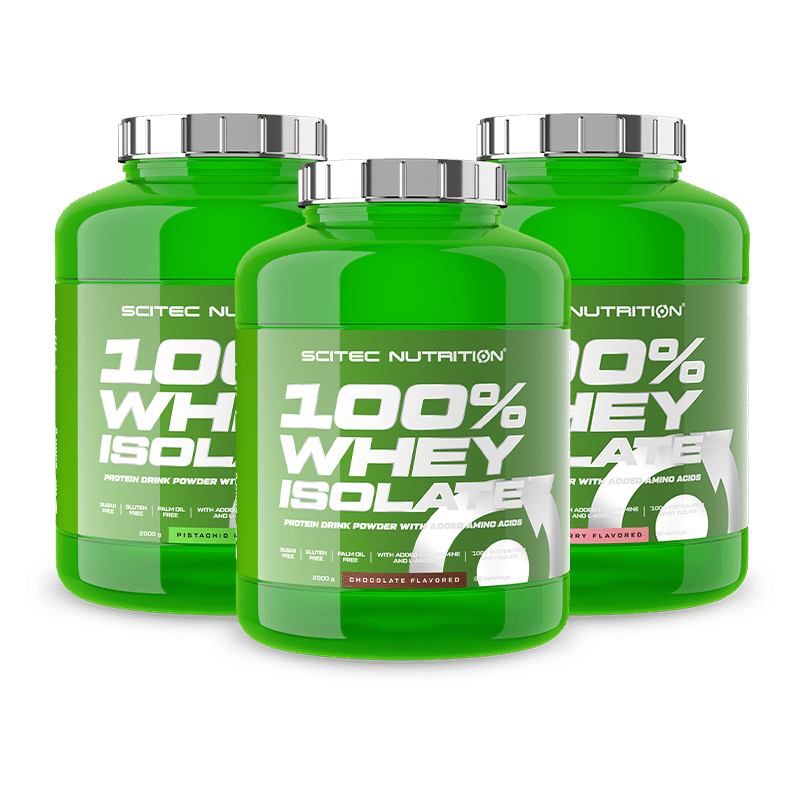Protein powder is no longer just for bodybuilders and elite athletes; it has become an integral part of many people’s daily diets. But what exactly is protein powder, and why has it become so popular?
From its role in muscle building and weight management to the various types available on the market, we will provide you with the information you need to understand this versatile supplement. We will also address some of the most common myths and misconceptions about protein powder, so you can make informed decisions about your own consumption.

Get your hands on our 100% Whey Isolate Protein Powder
Proteins, the building blocks of life, play a crucial role in nearly all biological processes in the human body.
Proteins are large, complex molecules that perform many critical functions in the body. They consist of smaller units called amino acids, which are linked in long chains. There are 20 different types of amino acids, and the sequence in which they are arranged determines the specific protein’s structure and function.
Proteins are found in every cell of the human body and are essential for biological processes such as cell building and repair, transport and storage of molecules, and as enzymes and hormones.
Proteins are essential for a range of vital functions:
An adequate intake of proteins is important for health and well-being:
Proteins are not just an important part of our diet; they are fundamental to our body’s functioning and our overall health. By ensuring a sufficient and balanced intake of proteins, we can support everything from muscle building and weight management to maintaining a robust and healthy body throughout life. Remember, a varied diet rich in different protein sources is key to achieving the many health benefits that proteins offer.
Protein powder has become a staple in many people’s nutrition regimes, but with so many varieties on the market, it can be challenging to choose the right one.
Whey protein is one of the most popular protein powders, and for good reason. It’s a complete protein source, meaning it contains all nine essential amino acids necessary for the body. Whey protein is quickly absorbed by the body, making it ideal for post-workout use for rapid muscle recovery and building.
Casein is another animal-based protein derived from milk. Unlike whey protein, casein is absorbed more slowly in the body. This makes it ideal as a supplement before bedtime, as it provides a sustained release of amino acids, beneficial for muscle building and overnight repair.
Soy protein is a popular plant-based alternative and is particularly suitable for vegetarians and vegans. It’s also a complete protein source, which is relatively rare for plant-based proteins. Soy protein is known for its ability to promote muscle growth and is a good option for those looking for a non-dairy-based protein powder.
Pea protein is another plant-based protein source gaining popularity. It’s rich in iron and is allergy-friendly, making it a good choice for individuals with allergies to dairy or soy. However, pea protein is not a complete protein source, so it may need to be supplemented with other protein sources to achieve a balanced amino acid profile.
When comparing animal and plant-based protein sources, there are a few key differences to note:
The choice of protein powder depends on individual nutritional needs, dietary restrictions, and personal preferences. Whether you prefer animal- or plant-based protein sources, there are plenty of options to choose from. The most important thing is to find a protein powder that suits your lifestyle and helps you achieve your health and fitness goals.

Protein powder is a great way to supplement your daily protein intake, especially if you have specific health or fitness goals. But with an overwhelming selection of protein powders on the market, it can be hard to know which is right for you.
Before choosing a protein powder, it’s important to consider what your goals are. Are you interested in muscle building, weight loss, better nutrition, or do you need a protein boost in a busy lifestyle? Different types of protein powder may be more or less effective depending on your goals.
If you have allergies, it’s important to read the ingredient list carefully. Many protein powders contain lactose, nuts, soy, or gluten. For lactose-intolerant individuals, plant-based proteins are often a safe choice.
Taste is an important factor when choosing a protein powder. Many come in classic flavors like chocolate, vanilla, and strawberry, but there are also more unique varieties. Mixability is also important – some powders blend better than others and leave fewer lumps.
Choose protein powder from reliable brands that don’t contain unnecessary additives, artificial sweeteners, or fillers. Also check for third-party testing to ensure quality and purity.
While price is a factor, it’s important not to compromise on quality. Cheaper brands may contain less effective or lower-quality ingredients.
Protein powder is a versatile supplement that can be used in many different ways, depending on your personal health and fitness goals.
Protein is not just for bodybuilders or elite athletes; it is an excellent supplement for anyone looking to improve their nutrition. By consuming it at strategic times and integrating it into delicious recipes, you can easily boost your daily protein intake. Experiment with different recipes and find ways that best fit into your lifestyle and taste preferences.
Protein powder has become an integral part of many people’s nutrition and fitness routines, but its popularity also brings a number of misunderstandings and myths. In this article, we will address some of the most common myths about protein powder and clarify them with scientific facts.

While protein powder can be a valuable addition to many people’s diets, it is important to understand its actual role and limitations. It is a supplement that can help meet specific nutritional needs, but it is not a magic solution or a necessity for everyone.
By basing our choices and use of protein powder on scientific facts rather than popular assumptions, we can better integrate this supplement into our diet in a way that supports our health and fitness goals. Always remember to read product labels carefully, choose quality products, and consider protein powder as part of a larger, balanced approach to nutrition and health.
Protein powder is a dietary supplement. Typically made by extracting protein from sources like milk (whey or casein), peas, rice, or soy. It’s used to increase protein intake, especially among athletes, people on specific diets, or those needing an extra protein boost.
Protein powder can be useful for athletes, bodybuilders, people on weight loss programs, vegetarians and vegans, and individuals who do not get enough protein through their regular diet.
While protein powder can be used as part of a meal replacement, it should not regularly replace whole meals. It’s important to have a balanced diet that contains a wide range of nutrients.
Generally, protein powder is safe for most people when consumed in moderate amounts. However, overconsumption can lead to side effects such as digestive issues, kidney-related problems (especially in those with existing kidney issues), and nutrient imbalances.
Choose a protein powder based on your individual needs, dietary preferences, and health goals. Also consider any allergies or intolerances. Read labels to avoid unnecessary additives and ensure the product is of high quality.
This depends on your goals. After exercise can help with muscle repair, before exercise can increase energy, as a snack can help keep you full, and before bedtime (especially casein protein) can support overnight muscle repair.
Yes, plant-based protein powders, like those made from peas or soy, can be just as effective. It’s important to ensure they contain a balanced profile of essential amino acids.
© 2024 Only Approved – Designed by Aveo web&marketing
Socials
Socials